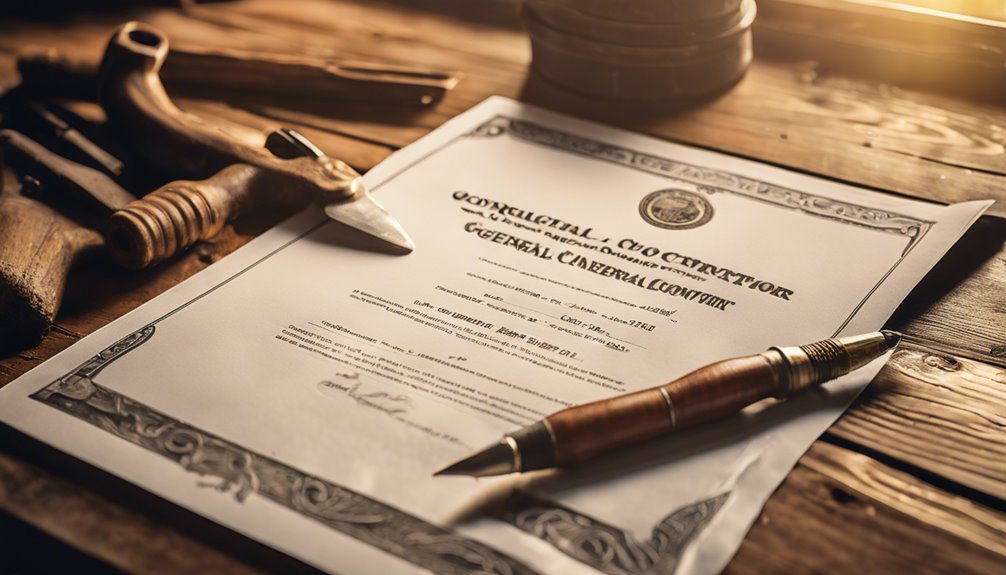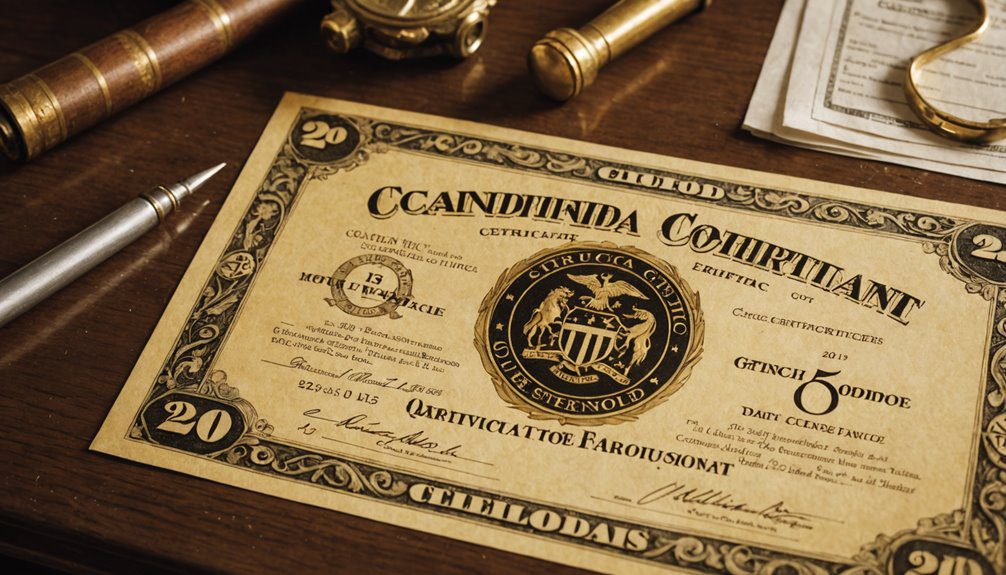If you're a contractor in South Carolina, you know that obtaining a General Contractor License Bond is essential for operating legally. This bond not only ensures that you comply with local regulations but also protects your clients and enhances your credibility. However, navigating the requirements and processes involved can be complex. What do you need to know about the different types of bonds, their costs, and the consequences of non-compliance? Understanding these aspects could significantly impact your business and reputation in the industry.
What Is a License Bond?

A license bond is a type of surety bond that ensures you comply with state regulations when operating as a contractor. This bond protects the public by guaranteeing that you'll adhere to the rules and standards set by the state. If you fail to meet these obligations, the bond provides a financial safety net for those affected. The bond acts as a contract between you, the surety company, and the state.
When you apply for a license bond, you'll typically need to provide information about your business, including your financial history and the types of services you offer. The surety company evaluates your application, assessing your creditworthiness and risk factors. Once approved, you'll pay a premium, which is a small percentage of the bond amount.
Having a license bond isn't just a requirement; it's also a mark of professionalism. It shows clients that you're serious about your business and committed to upholding industry standards. License and permit bonds are designed to hold businesses accountable for adhering to licensing laws.
In South Carolina, securing this bond is essential for obtaining your general contractor license, allowing you to operate legally and build trust with your clients.
Importance of License Bonds
Understanding the importance of license bonds is crucial for any contractor looking to establish a reputable business. These bonds not only protect your clients but also enhance your credibility in the industry. When you obtain a license bond, you demonstrate that you're committed to complying with local laws and regulations. This builds trust with potential customers, giving them confidence in your services.
Additionally, having a license bond can set you apart from competitors. Clients often prefer working with bonded contractors, knowing they've financial recourse if something goes wrong. This can give you a significant advantage when bidding for projects.
Moreover, license bonds help safeguard your business against potential claims. If a dispute arises, the bond can be used to cover damages, protecting your personal and business assets. This layer of security allows you to focus on your work instead of worrying about unforeseen issues. Furthermore, these bonds are regulated by the Illinois Department of Financial and Professional Regulation, ensuring that they meet necessary legal standards for compliance.
Requirements for South Carolina

To obtain a general contractor license bond in South Carolina, you'll need to meet several specific requirements. First, you must hold a valid general contractor license issued by the South Carolina Department of Labor, Licensing, and Regulation (LLR). This involves passing an examination that tests your knowledge of construction laws, safety practices, and business management.
Next, you'll need to provide proof of liability insurance. This insurance protects you and your clients in case of accidents or damage during a project. The amount of coverage required varies based on the type of work you plan to perform, so be sure to check the specific requirements for your field.
Additionally, you must secure a performance bond. This bond ensures that you'll complete your projects according to the agreed terms and conditions. The bond amount will depend on the size and scope of your projects. Furthermore, having a Louisiana Motor Fuels Tax bond can offer financial assurance for contractors in related fields.
Types of License Bonds
What types of license bonds do you need as a general contractor in South Carolina?
As a general contractor, you'll typically need a couple of essential bonds to ensure compliance with state regulations and to protect your clients. The primary bond you'll require is the general contractor license bond. This bond guarantees that you'll adhere to local laws and regulations while completing your projects. It also serves as financial protection for your clients in case you fail to fulfill your contractual obligations.
In addition to the general contractor license bond, you might need specialized bonds based on the nature of your work. For instance, if you're involved in home improvement projects, a home improvement contractor bond may be necessary. Similarly, if you deal with public works projects, you might require a performance bond or a payment bond to secure your obligations to subcontractors and suppliers. Understanding the specific types of bonds applicable to your business is crucial for compliance and smooth operations.
Furthermore, obtaining the appropriate bonds not only fulfills legal requirements but also enhances trust building with clients and stakeholders. Always check with the South Carolina Licensing Board or a bonding company to ensure you have the correct bonds in place before starting your contracting work.
The Bond Application Process

Navigating the bond application process as a general contractor in South Carolina can seem daunting, but it doesn't have to be. To start, you'll need to gather essential documents, such as your business license, financial statements, and any required certifications. This preparation can streamline your application and help you avoid delays.
Next, you'll want to research bonding companies that operate in South Carolina. Look for reputable firms that specialize in contractor bonds, as they can provide guidance tailored to your needs. Once you've identified a few options, reach out to them for quotes and ask about their specific application requirements.
When you're ready to apply, complete the application form accurately and provide all requested documentation. Be honest about your work history, financial situation, and any past claims, as transparency can foster trust with the bonding company. Additionally, ensure that you understand the types of surety bonds required for your specific contracting work, as each may have different implications for your application.
After submission, the bonding company will typically review your application and may require additional information or an interview.
Once approved, you'll receive your bond, allowing you to proceed with your contracting work. Remember, staying organized and proactive during this process can make it much smoother.
Costs Involved With License Bonds
Understanding the costs involved with license bonds is crucial for your budgeting as a general contractor in South Carolina. When you apply for a license bond, you typically pay a premium, which is a percentage of the bond amount. This premium usually ranges from 1% to 5%, depending on factors like your credit score and the bonding company's assessment of your risk.
For example, if your bond amount is set at $10,000, you might pay anywhere from $100 to $500 annually. Keep in mind that your credit history can significantly influence this rate. If you have poor credit, you may face higher premiums or even difficulty obtaining a bond.
In addition to the premium, there could be other costs associated with obtaining your bond. Some bonding companies may charge application fees, so it's wise to ask about any hidden costs upfront. Additionally, understanding your credit score can help you secure more favorable bond rates.
Also, consider that some contractors choose to renew their bonds annually, which means you'll need to budget for ongoing costs.
Maintaining Your License Bond

Maintaining your license bond is essential for complying with South Carolina regulations and protecting your business. To keep your bond active, you'll need to pay attention to a few key factors.
First, ensure that your bond amount meets the current state requirements. Regulations can change, and staying updated will help you avoid any potential issues.
Next, regularly review the terms and conditions of your bond. This includes understanding any specific obligations you may have as a contractor. If you've made changes to your business structure or services, you may need to adjust your bond accordingly.
It's also crucial to renew your bond on time. Most bonds have an expiration date, and failing to renew can lead to lapses in coverage. Set reminders for yourself well in advance of the due date to avoid any last-minute rush.
Lastly, maintain open communication with your bonding company. They can provide assistance and guidance, ensuring you're always compliant. Additionally, be aware of the specific requirements for each bond type as they can vary and may impact your ability to operate effectively.
Consequences of Non-Compliance
Failing to stay compliant with your license bond requirements can lead to serious repercussions for your construction business. First and foremost, you risk losing your general contractor license. Without this license, you can't legally operate, which could halt projects and lead to financial losses.
If clients discover your non-compliance, it could damage your reputation. Trust is crucial in this industry, and a tarnished image can deter potential clients from hiring you. Additionally, non-compliance may result in fines or penalties imposed by the state. These financial burdens can strain your business and impact your bottom line.
Moreover, your surety bond provider can take action against you, potentially leading to increased premiums or even cancellation of your bond. This could leave you without essential protection for your projects, exposing you to further liabilities.
In extreme cases, repeated violations can lead to criminal charges, damaging your personal reputation and career. To safeguard your business, prioritize compliance with all license bond requirements, and stay informed about any changes in regulations. Doing so ensures your construction business remains viable and respected in the industry. Furthermore, understanding the importance of surety bonds can help you navigate the complexities of compliance effectively.
Conclusion
In summary, securing your South Carolina General Contractor License Bond is essential for your business and reputation. It not only shows your commitment to compliance and industry standards but also protects your clients and yourself from potential disputes. By understanding the requirements and maintaining your bond, you ensure a smooth operation and avoid the consequences of non-compliance. Take the necessary steps today to uphold your credibility and keep your contractor license valid for years to come.


